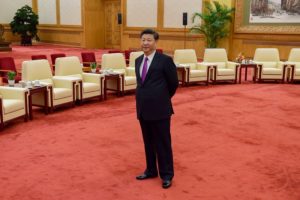
Chinese President Xi Jinping awaits U.S. Secretary of State John Kerry, U.S. Treasury Secretary Jack Lew, and members of their delegation as they arrive on June 7, 2016, at the Great Hall of the People in Beijing, China, to attend a bilateral meeting following a two-day Strategic and Economic Dialogue between U.S. and Chinese officials. [State Department photo/ Public Domain]
It turns out to be a trap few countries escape: Of 101 countries defined as “middle income” in 1960, only 13 rose to high-income by 2008, according to a World Bank report. And some of these countries, like Greece, are prone to slip backward.
Beijing’s dilemmas go deeper. Economic reforms generate sudden riches that are ripe targets for extravagant graft, particularly by powerful state actors. Graft creates incentives for further self-dealing, which distorts economic decision-making and breeds public cynicism. Aggressive anti-corruption drives of the sort carried out by Xi since coming to power often amount to power plays between political factions competing for booty.
The result: more corruption, more cynicism, more repression. How long that can keep going is an open question.
Later in the piece, Stephens explores just how long it may continue, writing:
But scholars such as Larry Diamond and Minxin Pei have noted that dictatorships tend to have a roughly 70-year lifespan. At some point, the revolutionary fervor that sustains the first generation of leaders and the will to power that sustains the second gives way to the policy failures, mounting discontents, outside shocks and inner doubts that prove the undoing of the third.
Especially when the regime experiences some kind of blunt trauma, either in the form of a foreign-policy fiasco, an economic shock, or a moral outrage. In its attempts to respond to Hong Kong’s protests, Beijing risks all three.
Read more here.
